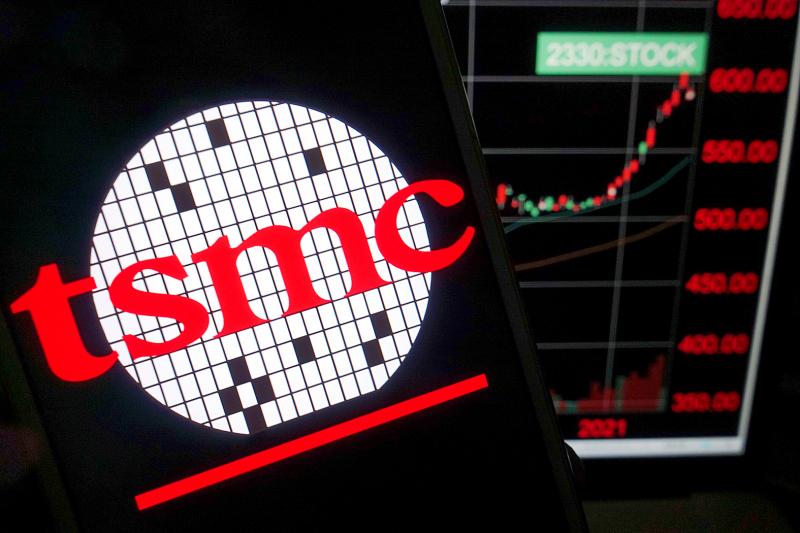Taiwan Semiconductor Manufacturing Co (TSMC, 台積電) is considering building an advanced IC packaging plant in the US following a massive investment to set up a wafer fab in Arizona, Nikkei Asia reported.
TSMC was considering the plant in response to “Washington’s desire to bring more of the tech supply chain onto home turf,” the report said.
TSMC increasingly faces the need to expand in the US, which accounts for about 62 percent of its total sales, Nikkei Asia said, citing three sources who declined to be named.

Photo: CNA
The potential US plant would be equipped with the latest 3D stacking technologies to arrange chips with different functions in one package, it said.
US EXPANSION
TSMC last year announced that it would invest US$12 billion to establish a wafer plant in Arizona, the company’s first new fab outside Taiwan in more than two decades. The facility is under construction.
The plant is to use the chipmaker’s 5-nanometer process, its latest technology, which has been used for mass production at its Taiwan fabs since the second quarter of last year.
TSMC is also developing 3 and 2-nanometer processes, with commercial production using the new technology to start next year.
The Arizona facility would make chips for Apple Inc’s newest generation of iPhones and Mac computers.
In April, TSMC chief executive officer C.C. Wei (魏哲家) said that construction at the plant was on schedule.
Production at the facility is to start in 2024.
TSMC had acquired an additional plot in the US that could be used for expansion in the country, depending on client demand, operations and cost efficiency, Wei said.
The US market, as well as other global markets, is heavily dependent on chips from Taiwan, raising concerns in Washington over supply chain risks, Nikkei Asia said.
This was because of China’s threats to use military force against Taiwan, it said.
For the Arizona plant, “the most certain part is the initial capacity of 20,000 wafers per month,” Nikkei Asia said, quoting one of the sources. “TSMC surely has further expansion blueprints.”
‘CAUTIOUS’
“The company is cautious not to make commitments too early, as there are a lot of uncertainties that need to be taken into consideration, including geopolitical factors,” the report said.
TSMC is planning to expand the plant’s capacity to 120,000 units per month, Nikkei Asia said.
Only four of TSMC’s wafer fabs have a monthly production capacity of more than 100,000 units, the report said, adding that the four plants are in Taiwan.
IC packaging “is also highly centralized in Asia, and is an area where Washington wants more self-reliance,” the report said.
“Once viewed as relatively unsophisticated, packaging is becoming more important and innovative as the pace of technological advances in chipmaking slows and chipmakers try to eke out more performance,” it added.
TSMC has moved aggressively into high-end IC packaging and testing to provide one-stop shopping services for wafer clients who also require advanced 3D IC packaging and testing technology.
TSMC is building an advanced IC packaging plant in Miaoli County, where it is to start production next year for clients including Advanced Micro Devices Inc and Google, Nikkei Asia said.
TSMC operates advanced IC packaging and testing plants in Taoyuan, Hsinchu, Taichung and Tainan.

Sweeping policy changes under US Secretary of Health and Human Services Robert F. Kennedy Jr are having a chilling effect on vaccine makers as anti-vaccine rhetoric has turned into concrete changes in inoculation schedules and recommendations, investors and executives said. The administration of US President Donald Trump has in the past year upended vaccine recommendations, with the country last month ending its longstanding guidance that all children receive inoculations against flu, hepatitis A and other diseases. The unprecedented changes have led to diminished vaccine usage, hurt the investment case for some biotechs, and created a drag that would likely dent revenues and

Macronix International Co (旺宏), the world’s biggest NOR flash memory supplier, yesterday said it would spend NT$22 billion (US$699.1 million) on capacity expansion this year to increase its production of mid-to-low-density memory chips as the world’s major memorychip suppliers are phasing out the market. The company said its planned capital expenditures are about 11 times higher than the NT$1.8 billion it spent on new facilities and equipment last year. A majority of this year’s outlay would be allocated to step up capacity of multi-level cell (MLC) NAND flash memory chips, which are used in embedded multimedia cards (eMMC), a managed

CULPRITS: Factors that affected the slip included falling global crude oil prices, wait-and-see consumer attitudes due to US tariffs and a different Lunar New Year holiday schedule Taiwan’s retail sales ended a nine-year growth streak last year, slipping 0.2 percent from a year earlier as uncertainty over US tariff policies affected demand for durable goods, data released on Friday by the Ministry of Economic Affairs showed. Last year’s retail sales totaled NT$4.84 trillion (US$153.27 billion), down about NT$9.5 billion, or 0.2 percent, from 2024. Despite the decline, the figure was still the second-highest annual sales total on record. Ministry statistics department deputy head Chen Yu-fang (陳玉芳) said sales of cars, motorcycles and related products, which accounted for 17.4 percent of total retail rales last year, fell NT$68.1 billion, or

In the wake of strong global demand for AI applications, Taiwan’s export-oriented economy accelerated with the composite index of economic indicators flashing the first “red” light in December for one year, indicating the economy is in booming mode, the National Development Council (NDC) said yesterday. Moreover, the index of leading indicators, which gauges the potential state of the economy over the next six months, also moved higher in December amid growing optimism over the outlook, the NDC said. In December, the index of economic indicators rose one point from a month earlier to 38, at the lower end of the “red” light.